‘Every second felt like eternity’: Inside the torture chambers of Ukraine’s occupied northeast
Detention, rape, beatings and executions. Ordinary Ukrainians endured unimaginable horror in areas captured by Russian troops. Bel Trew in Balakiya, Izium, Pisky-Radkivski speaks to those who survived as they try to pick up their shattered lives

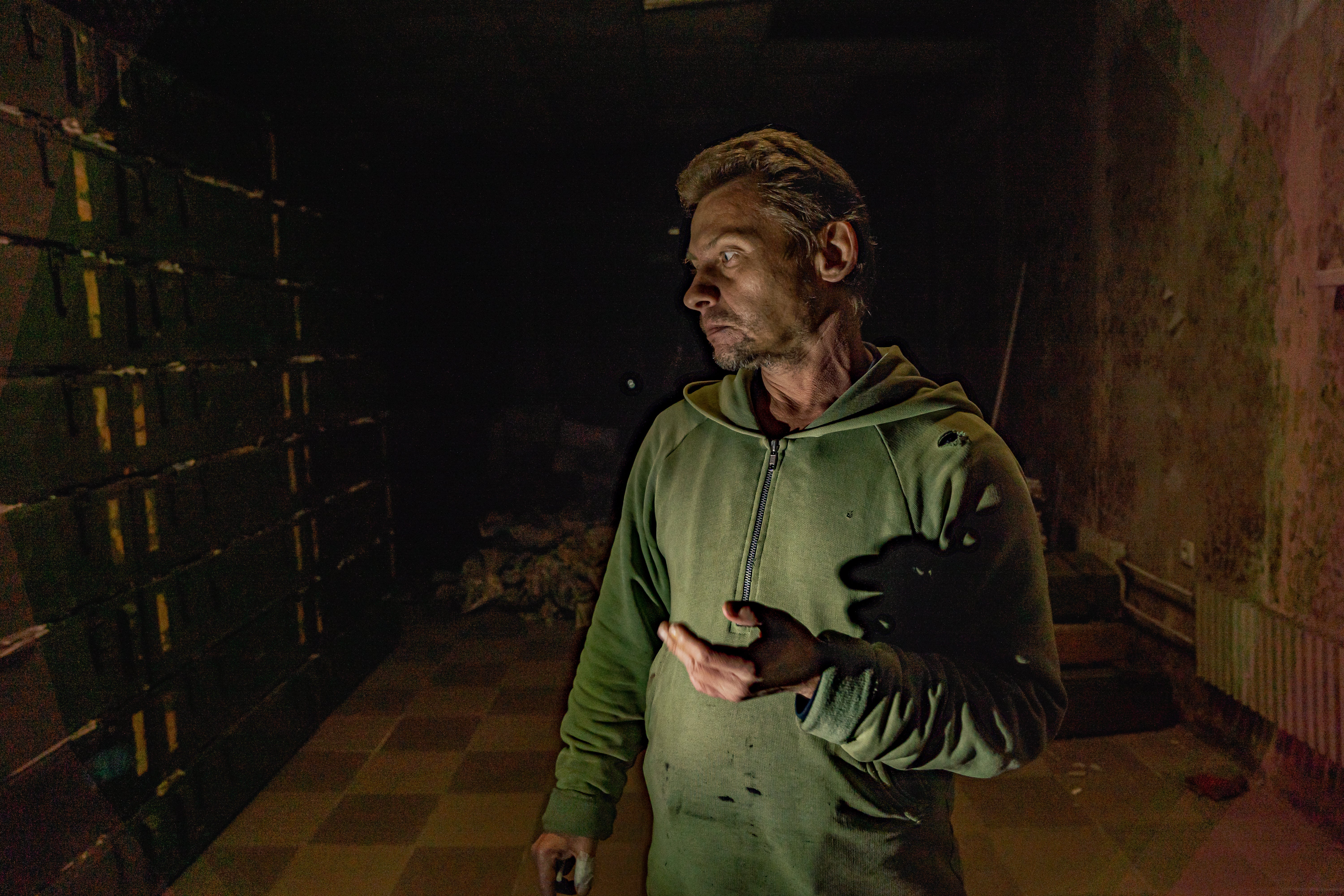
Your support helps us to tell the story
From reproductive rights to climate change to Big Tech, The Independent is on the ground when the story is developing. Whether it's investigating the financials of Elon Musk's pro-Trump PAC or producing our latest documentary, 'The A Word', which shines a light on the American women fighting for reproductive rights, we know how important it is to parse out the facts from the messaging.
At such a critical moment in US history, we need reporters on the ground. Your donation allows us to keep sending journalists to speak to both sides of the story.
The Independent is trusted by Americans across the entire political spectrum. And unlike many other quality news outlets, we choose not to lock Americans out of our reporting and analysis with paywalls. We believe quality journalism should be available to everyone, paid for by those who can afford it.
Your support makes all the difference.At night, when the street outside was quiet, Olga would hear the screams of women being gang-raped by Russian soldiers in the interrogation room one floor above her tiny squalid cell.
Together with her fellow female inmates, sleeping stacked side-by-side like cutlery in a drawer, she would try to block out the terrifying sound.
But the sharp barks of the Chechens spurring each other on, punched through the cries.
“I could hear them shouting ‘come on, you have a go next’,” says the 50-year-old call centre operator at her hometown’s fire department.
“They threatened all of us with rape during the day but the torture and violence always took place at night. Because the street outside was quiet and our cell was under the torture room, we heard it all,” she adds her voice shrinking into a pause.
Together with her husband, a 57-year-old businessman, she was held by Russian soldiers in the police station at Balakiya, a town in the northeastern region of Kharkiv, which before the war was home to an important railroad junction.
Moscow’s men captured the town and the surrounding Izium district at the start of March shortly after President Putin launched his invasion of Ukraine. They held onto it for six months until a counteroffensive forced them to withdraw in September.
Like many towns The Independent has visited across recently liberated territory in the northeast and south of the country, the soldiers quickly took over the town’s main police department and other key administrative buildings.
They filled holding cells and basements, they partitioned off using stacked ammunition boxes, with anyone they deemed to be a threat: from family members of soldiers in the Ukrainian military to those accused of simply being pro-Ukrainian. Dozens of testimonies recount similar grim tales of torture, arbitrary detention, rape, enforced disappearance, forcible transfer to Russia, and summary executions. All are potential war crimes and all were rife.
The Russian authorities have repeatedly and vehemently denied committing any crimes in Ukraine. The Kremlin has accused Ukraine of deliberately staging atrocities to win international support. But the Kharkiv regional prosecutor’s office said that in the recently liberated areas alone they have uncovered 623 bodies of dead civilians and were investigating more than 8,200 suspected crimes including allegations of torture and murder.
They are also trying to find hundreds of missing people: since the war the Kharkiv regional police had received nearly 1,100 reports of missing people, around a third of which have been found. Thousands more are missing countrywide.
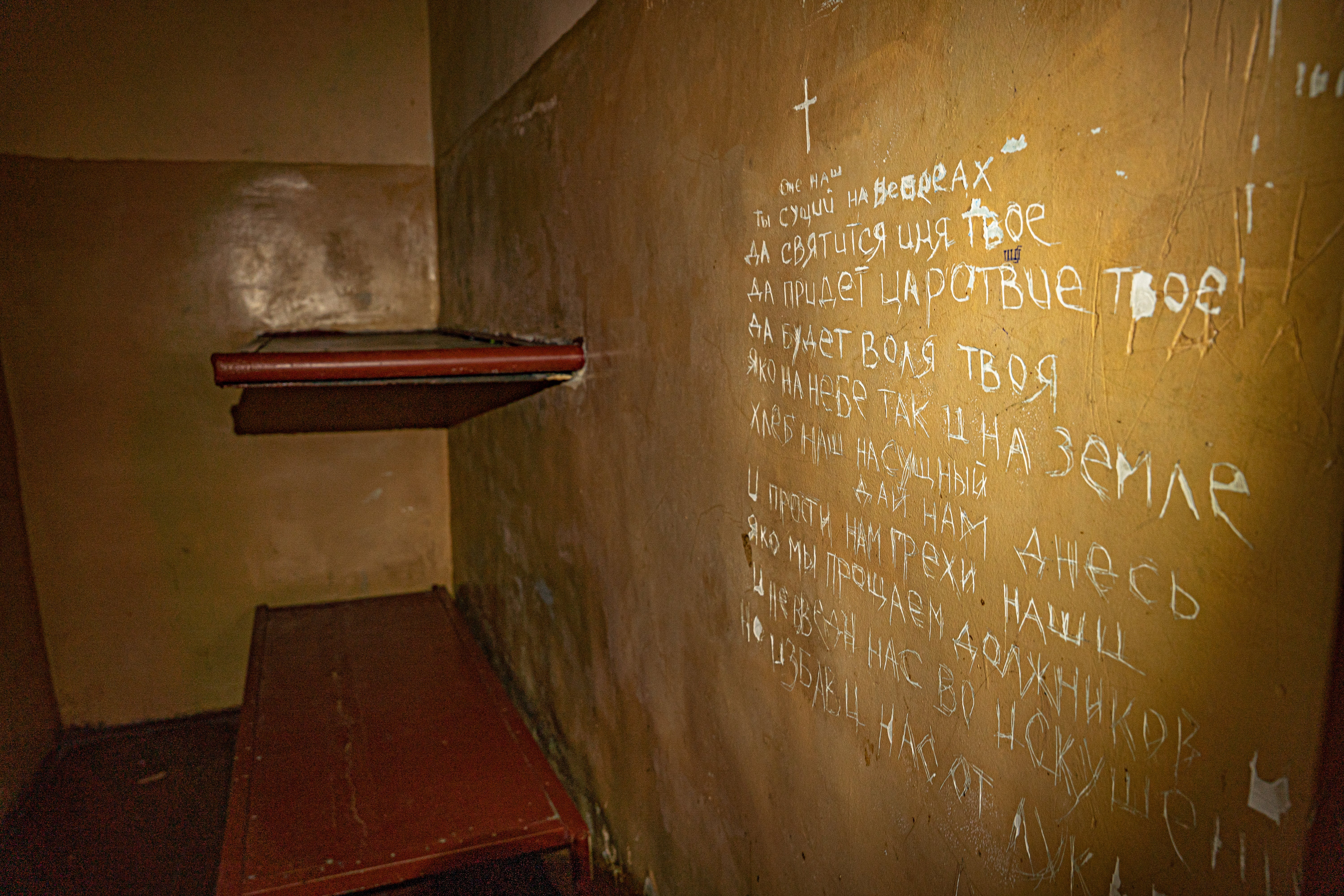
And the abuse in Izium, in particular, was so routine Human Rights Watch concluded “this treatment was part of a policy and plan”. HRW interviewed 100 people in the city, the regional capital located about 120km (75 miles) from Kharkiv. There, survivors described being subjected to waterboarding, severe beatings, sexual violence and threats at gunpoint. They echo testimonies gathered by The Independent, where people also told of soldiers threatening detainees by putting guns in their mouths and medicine being withheld.
But the worst torture was electrocution.
Oleksander, 49, a veteran firefighter in Balakiya who worked with Olga, was accused of informing the Ukrainian military about Russian positions and also detained in the police station.
Both Oleksander and Olga believe they were arrested because of pro-Russian co-workers at the fire department who informed on them, as Russian soldiers mobilised sympathetic inhabitants to spy on locals.
Oleksander says he was so badly tortured with electricity he could no longer stand after interrogation sessions and had to be dragged limp to his tiny cell by two soldiers.
“When they brought us to the police station they put bags on our heads and they told us ‘you can forget that you are alive, no one will find you again’,” the father of three says.
“Then they started the electrocution. They connected this device to your fingers and your legs and other parts of your body.”
“It’s hard to explain how painful it is, you lose complete control and just go into spasms,” he adds. He said the pain was so intense “every second felt like eternity”.
He was held for two weeks but one of his cellmates – a man from a nearby village – was incarcerated for 86 days straight. The Russians would only allow them outside of the squalid room for five minutes a day to use the toilet, and so crammed into a tiny windowless dark cell for three months, this man, like many others, had to learn to walk again when freed.
“His muscles had just wasted away,” Oleksander adds.
It’s hard to explain how painful electrocution is, you lose complete control and go into spasms
Notches scratched into the wall of Oleksander’s cell show how other inmates were held for three and four weeks. Another inmate, who was particularly desperate, has etched the Lord’s Prayer into the concrete.
“There are those who are still missing,” Oleksander adds grimly.
“I know of at least five people who never came back. Their relatives keep calling me asking me what happened because they were in the jail at the same time as me. But I just don’t know. Their fate is unknown.”
Police officers across this northeastern slice of Ukraine have reportedly logged more than 1,000 cases of people being detained by Russian soldiers in police stations and makeshift holding centres during the half-year occupation. But these are only the cases they know about – it is feared the true number is more than three times that amount.
Officials still don’t know how many people are missing, and investigations are ongoing. They have also exhumed hundreds of bodies, the vast majority of which were unearthed in Izium.
There, one of the city police says that of the 500 bodies they personally uncovered at least 20 were civilians, whose bodies showed signs of being shot “execution-style”. Many were found in a mass grave hidden in the woods.
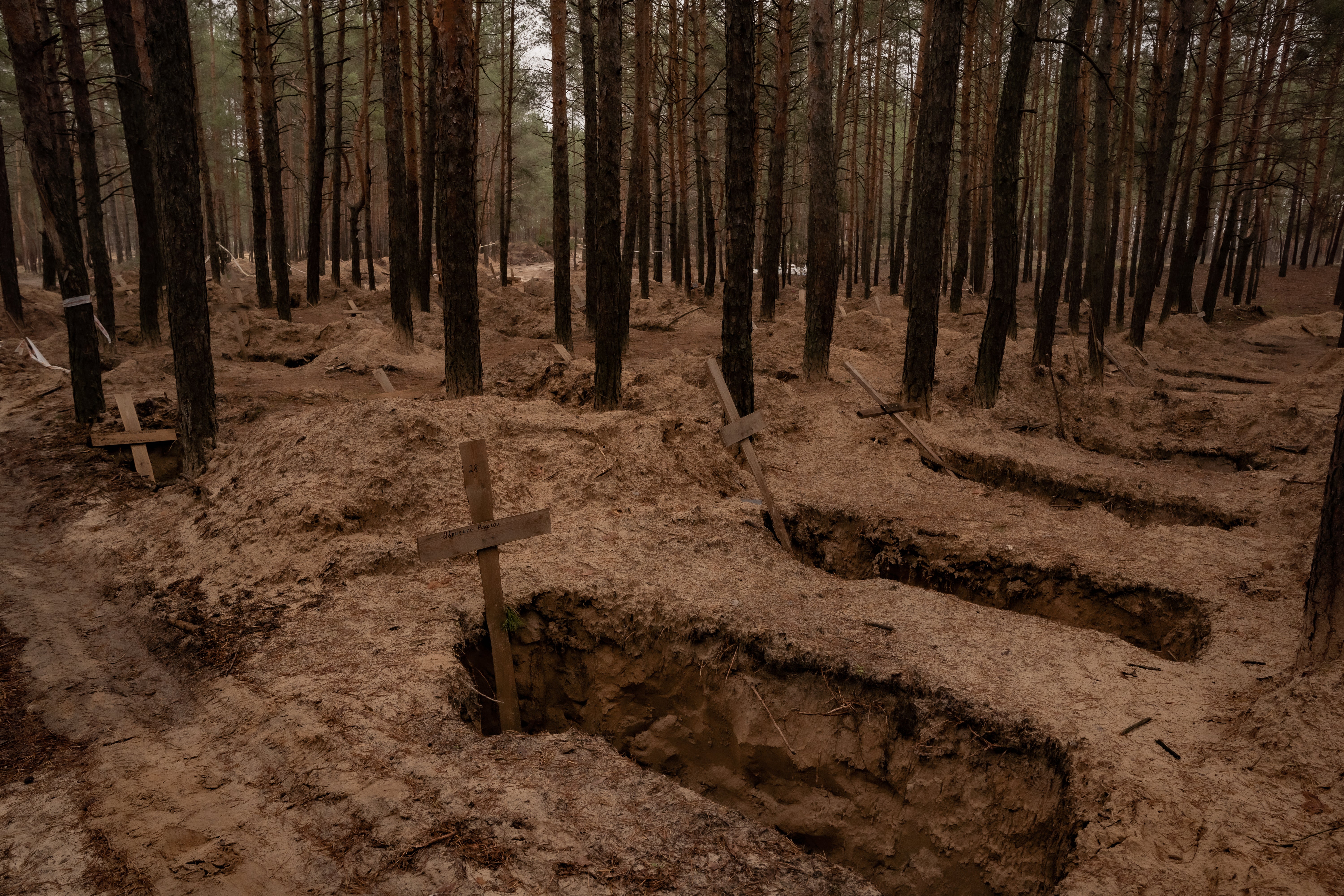
“We are still finding bodies every day; just yesterday we exhumed three bodies,” he says, asking for anonymity as he is not authorised to speak to the media. Behind him, families gather waiting for any information about their missing loved ones.
“We are dealing with multiple investigations including rape, executions and disappearances. Every day people come to the police station to try to find out where their missing relatives are.”
The abuse was so rampant and routine in Izium in particular that HRW concluded there was clearly a strategy in play. The rights group interviewed more than 100 people in the city and almost all said that they had a family member or friend who had been tortured. Fifteen people – 14 men and one woman – described being tortured themselves.
“The cruel violence and abuse in Izium were not random incidents,” Belkis Wille, HRW’s senior crisis and conflict researcher writes in their latest report.
“Multiple victims shared credible accounts with us of similar experiences of torture during interrogation in facilities under the control of Russian forces and their subordinates, indicating this treatment was part of a policy and plan.”
This seems true in Balakiya. We are shown around an interrogation and holding chamber set up to carry the overspill from the police station.
It is located in a newspaper printing house opposite the police station. Cells were fashioned out of discarded ammunition boxes in the basement.
There Dymtro, 40, a local typographer worker was held after being accused of trying to contact the Ukrainian armed forces. Like Olga and Oleksander he believes neighbours informed on him.
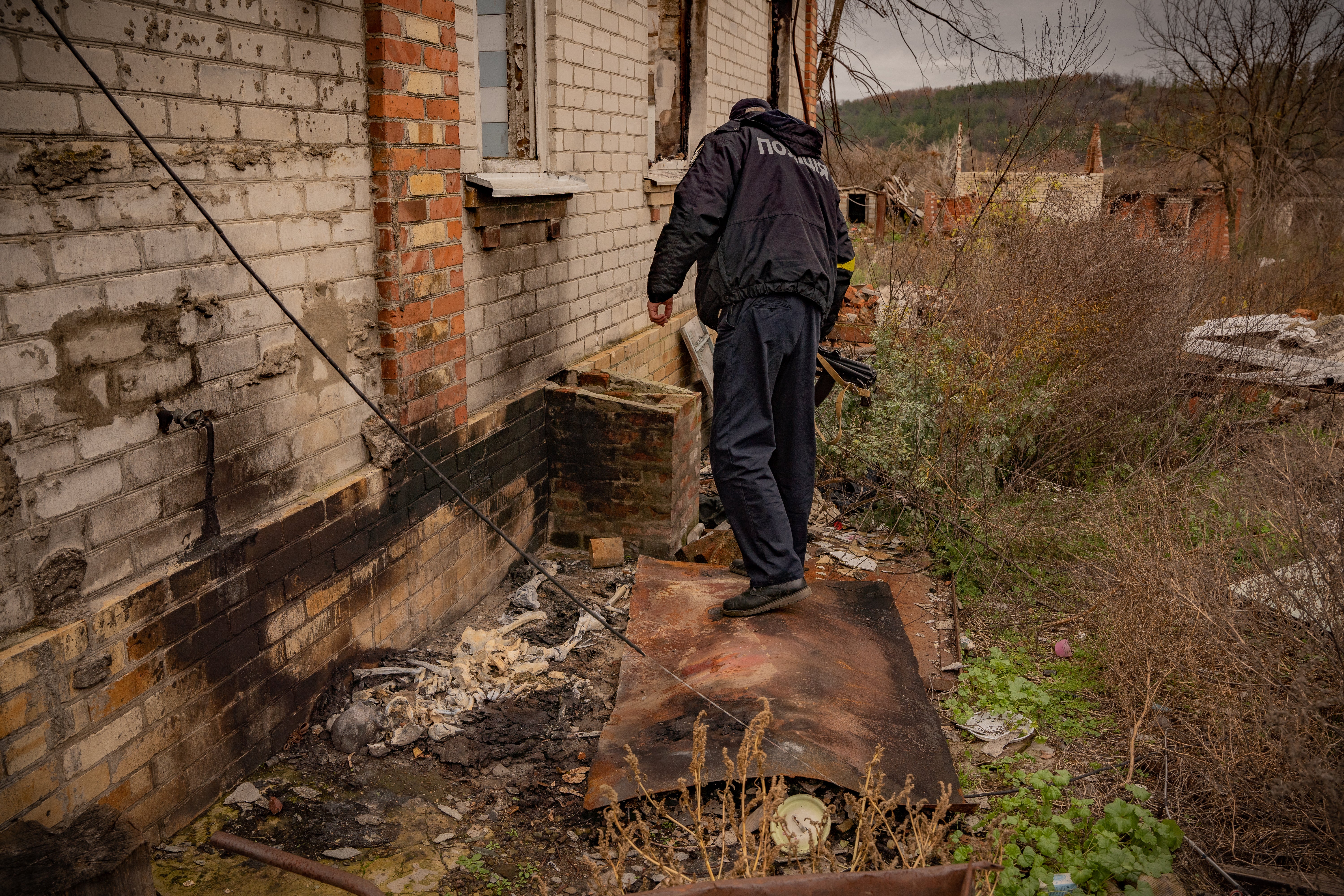
“They beat me in the basement with these clubs, I saw a girl in the corner being held and she was crying. [The soldiers] pushed your head to the ground and screamed,” Dymtro says, taking us around the eerily dark chamber.
“They didn’t let me go to the toilet for three days. They were coming every hour to check I was still bound.”
Fashioning interrogation rooms out of basements appears common in all the liberated areas. Around 25km east of Izium city, in a village called Pisky-Radkivski, The Independent was shown another torture room located under a cottage opposite the town’s main cultural centre which was taken over by soldiers as their main base in March.
In this village, the Ukrainian Ministry of Defence has accused Russian soldiers of burying people alive and smothering them with gas masks packed with smouldering rags, which The Independent was unable to verify. In one grisly incident, the MoD said they found a box full of gold tooth fillings, which may have been stolen from a local dentist.
Valentina Mykolaivs, 50, head of the cultural centre in the town which morphed into Russia’s main base, says residents could hear screams of torture by soldiers who she says were mostly drunk all the time. One Ukrainian resident, she declined to name, was accused of directing Ukrainian fire. He was beaten so badly two weeks before the Ukrainian army took back the town in September, that she says he is still in intensive care now in Kharkiv city.
“That was September, it’s November now, he is still seriously wounded, you can imagine his injuries,” she says.
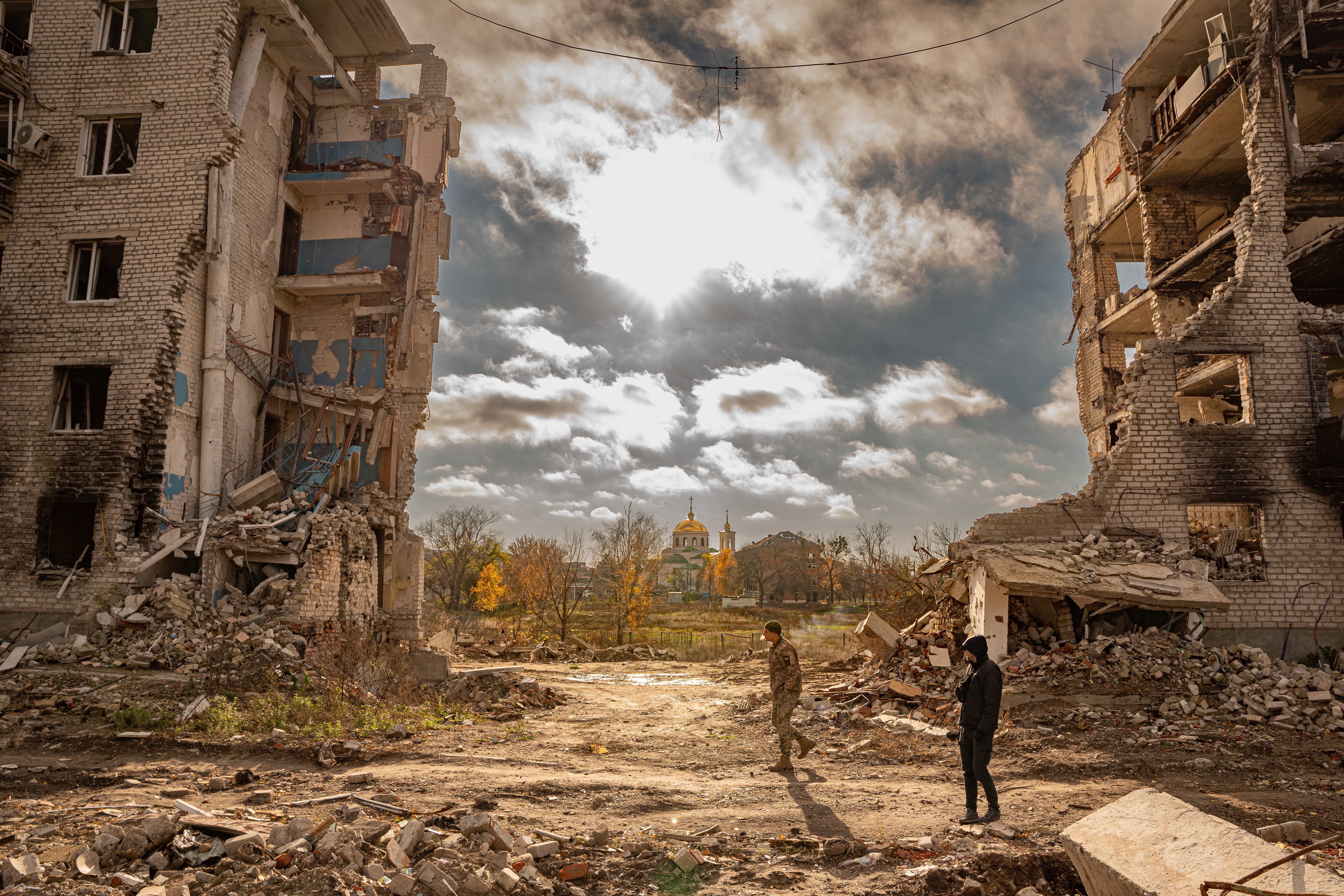
As new territory has been liberated in the south of the country in and around Kherson city, The Independent also stumbled upon fresh interrogation rooms. The fear is that the horrors described in the northeast will only be echoed in the south. Back in Balakiya, Olga believes the Russians deployed a network of local informers to more easily root out people and they deliberately targeted the fire fighting department and their families. The Independent has interviewed three members of the fire department who were tortured and detained in the town.
Olga explains how together with her husband, they were both eventually released as a Ukrainian counteroffensive pressed into the region, and the soldiers faced bigger problems. They were ejected out of the town into Ukrainian-held territory. Not all detainees were released. Some were left locked up in the police station when in September Russian troops fled the town. Residents had to break them out of the cells after Ukrainian forces rolled in.
Olga says the ordeal haunts her and her husband who suffers from gout and hypertension and is still recovering after he was barred access to life-sustaining medicine while in detention for 40 days. “Physically I’m OK, mentally I’m not. I am still trying to process what happened. All we can do is hope the war will end,” she says quietly.
Oleskander says even if the conflict ends the main problem is trying to find those who are still missing. There are reports some of those held in the Balakiya police station were deported to prisons in Russia, or were killed and buried in yet-to-be-discovered graves in occupied territory.
“There are still cases of people who were taken to interrogation who vanished. It was terrifying. When you are taken to that room you don’t know if you will come back,” he says shakily.
“At least five or six I know of never came back. And the truth is we may never find them.”
Join our commenting forum
Join thought-provoking conversations, follow other Independent readers and see their replies
Comments